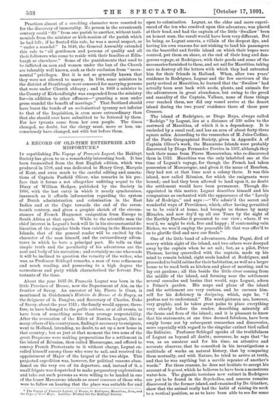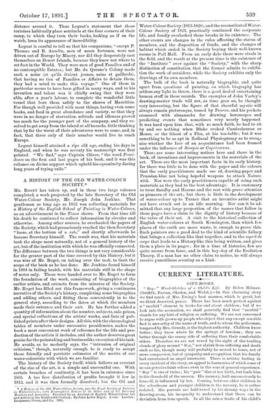A RECORD OF OLD-TIME ENTERPRISE AND MISFORTUNE.*
IN republishing The Voyaye of Francois Leguat, the Hakluyt Society has given to us a remarkably interesting book. It has been transcribed from the first English edition, which was produced in 1708, and was dedicated to Henry Grey, Marquis of Kent, and owes much to the careful editing and annota- tions of Captain Pasfield Oliver, who remarks in his pre- face that it forms a not altogether unfitting sequel to the Diary of William Hedges, published by the Society in 1886, with the last entry in which it nearly synchronises, inasmuch as it affords information regarding the system of Dutch administration and colonisation in the East Indies and at the Cape towards the end of the seven- teenth century, and gives a graphic sketch of the circum- stances of French Huguenot emigration from Europe to South Africa at that epoch. While to the scientific man the chief interest in Leguat's book will lie in his circumstantial de- lineation of the singular birds then existing in the Mascarene Islands, that of the general reader will be excited by the character of the man himself, and the extraordinary adven- tures in which he bore a principal part. He tells us that simple truth and the peculiarity of his adventures are the soul and body of his narration ; and certainly no one who reads it will be inclined to question the veracity of the writer, who was, as Professor Schlegel remarks, a man of true refinement and much reading, and possessing to a high degree the earnestness and piety which characterised the fervent Pro- testants of the time.
About the year 1637-38, Francois Leguat was born in the little Province of Bresse, now the Department of Ain, on the frontier of Savoy. An ancestor of his, Pierre le Guat, is mentioned in Guichenon's Histoire de Bresse et de Bugey, as the Seigneur of in Fougere, and Secretary of Charles, Duke of Savoy, about the year 1511; the family would appear, there- fore, to have belonged to the petite noblesse, or at all events, to have been of something more than average respectability. After the revocation of the Edict of Nantes, Leguat, like so many others of his countrymen, finding it necessary to emigrate, went to Holland, intending, no doubt, to set up a new home in that country ; but as just at that moment the two sons of the great Duquesne were making preparations for a settlement in the island of Reunion, then called Mascaregne, and offered to convey French Protestants to it without charge, Leguat en- rolled himself among those who were to sail, and received the appointment of Major of the largest of the two ships. This projected expedition was, however, for political reasons aban- doned on the very eve of its departure, and, instead of it, a small frigate was despatched to make preparatory explorations and take out such persons as were willing to be landed in one of the lesser Mascarene islands as avant coureurs of those who were to follow on hearing that the place was suitable for and
• The Voyage of Francois Leguat, of Bresse, to Rodrigues, Mauritius, Jaya, and the Cape of Good Hope. London Printed for the Haklnyt Society.
open to colonisation. Legnat, as the elder and more experi- enced of the ten who resolved upon this adventure, was placed at their head, and had the captain of the little Swallow' been an honest man, the result would have been very different. But he being, as Leguat asserts, a villain of the deepest dye, and having his own reasons for not wishing to land his passengers on the beautiful and fertile island on which their hopes were centred, put them on shore, at the end of their long and dan- gerous voyage, at Rodriguez, with their goods and some of the necessaries furnished to them, and set sail for Mauritius, taking care to destroy all the letters with which they had entrusted him for their friends in Holland. When, after two years' residence in Rodriguez, Leguat and the few survivors of the party arrived at Mauritius, he learned that the Swallow' had actually been sent back with seeds, plants, and animals for the adventurers in great abundance, but owing to the greed and rascality of the Captain, Valleau, none of these things ever reached them, nor did any vessel arrive at the desert island during the two years' residence there of these poor Crusoes.
The island of Rodriguez, or Diego Rnys, always called " Rodrigo" by Leguat, lies at a distance of 330 miles to the eastward of Mauritius, of which it is a dependency. It is encircled by a coral reef, and has an area of about forty-three square miles. According to the researches of M. Jules Codine, of the Paris Geographical Society, given in Appendix A of Captain Oliver's work, the Mascarene Islands were probably discovered by Diogo Fernandez Pereira in 1507, although they took their name from Pierre Mascarenhas, who re-discovered them in 512. Mauritius was the only inhabited one at the time of Leguat's voyage, for though the French had taken possession of Mascaregne, and given it the name of Bourbon, they had not at that time sent a colony there. It was this island, now called Reunion, for which the emigrants were bound; and had they been allowed to land upon it, no doubt. thesettlement would have been permanent. Though dis- appointed in this matter, Leguat describes himself and his companions as enchanted with the appearance of the "Lovely Isle of Rodrigo," and says :—" We admir'd the secret and wonderful ways of Providence, which, after having permitted. us to be ruin'd at home, had brought us thence by many Miracles, and now dry'd up all our Tears by the sight of the Earthly Paradise it presented to our view ; where, if we wou'd, we might be rich, free and happy ; if contemning vain Riches, we wou'd employ the peaceable life that was offer'd to us to glorifie God and save our Souls."
One of the little band of adventurers, John Pagni, died of scurvy within sight of the island, and two others were decoyed away by the captain when he set sail ; but, as a pilot, Peter Thomas, having quarrelled with the captain, made up his mind to remain behind, eight souls landed at Rodriguez, and proceeded to build cabins for their habitation, as well as a larger house to be used both as kitchen and place of meeting, and to lay out gardens ; all this beside the little river coming from the middle of the island, and forming near the settlement several cascades and basins that would, says Leguat, adorn a Prince's garden. His maps and plans of the island and the settlement are very curious, and he excuses him- self for his deficiency in designing, which, says he, " I profess not to understand." His word-pictures are, however, very graphic, and he takes great pains to place everything very clearly before the reader, describing minutely all the fauna and flora of the island ; and it is pleasant to know that his statements, at one time deemed fabulous, have been amply borne out by subsequent researches and discoveries, more especially with regard to the singular extinct bird called the Solitaire. Professor Schlegel speaks of the truthfulness of Legnat as beyond all doubt; moreover, he says that "he was, as an amateur and for his time, an attentive and accurate observer, that he consulted in his investigations a multitude of works on natural history, that by comparing them mutually, and with Nature, he tried to arrive at truth, and that he was anything but a servile repeater of another's words." For these reasons, he does not hesitate to accept his account of le grant, which he believes to have been a monstrous water-hen. The gigantic tortoises now extinct in Rodriguez are yet to be found in the Seychelles, and osseous remain' s discovered in the former island, and examined by Dr. Gunther, show that the animal really bad the habit of raising its neck to a vertical position, so as to have been able to see for some distance around it. Thus Legnat's statement that these tortoises habitually place sentinels at the four corners of their camp, to which they turn their backs, looking as if on the watch, loses its appearance of incredibility.
Leguat is careful to tell us that his companions, "except P. Thomas and R. Anselin, men of mean fortunes, were not driven out of Europe by Misery, nor did they desperately cast themselves on Desert Islands, because they knew not where to set foot in the World. They were men of good Families and of no contemptible Estates ; but Mr. du Quesne's Colony made such a noise (et qu'ils etaient jeunes, sains et gaillards), that having no ties of Families or Affairs to detain them, they had a mind to make this voyage." One of them in particular seems to have been gifted in many ways, and to his invention and talent was it chiefly owing that they were able, after a year's labour, to complete the wonderful little vessel that bore them safely to the shores of Mauritius. For though well provided with most things, having even some books, and food in great abundance and variety, so that they were in no danger of starvation, solitude and idleness proved too much for the younger part of the company, and they re- solved to get away from the island at all hazards, little thinking that by far the worst of their adventures were to come, and, in fact, that three only of their number would live to reach Europe.
Leguat himself attained a ripe old age, ending his days in England, and when be was seventy his manuscript was first printed. " We find," says Captain Oliver, " the word Provi- dence on the first and last pages of his book, and it was this reliance on divine support which upheld his equanimity during long years of trying exile."



































 Previous page
Previous page